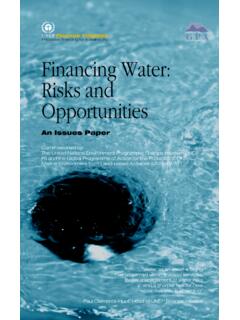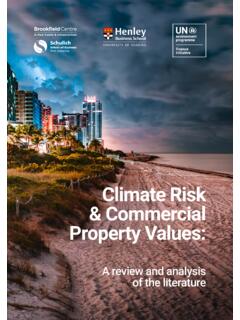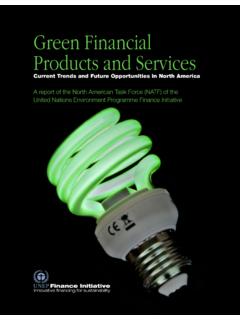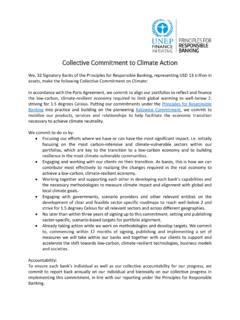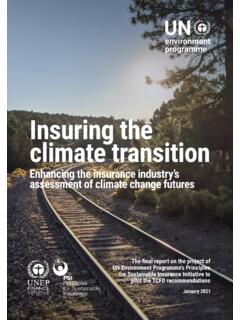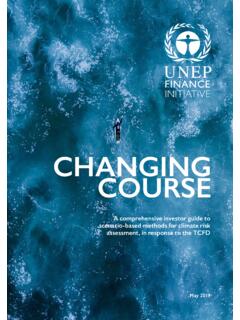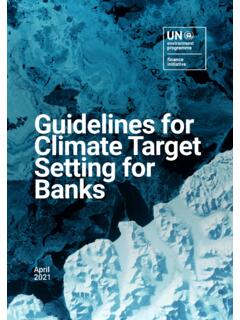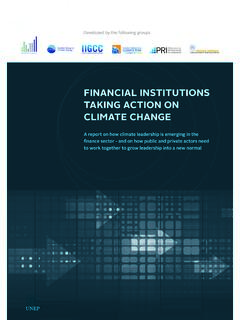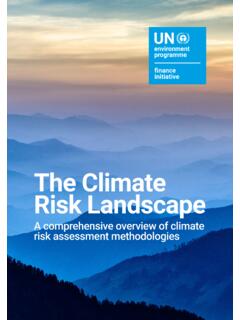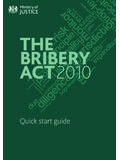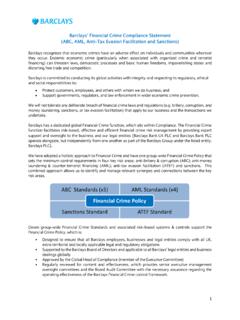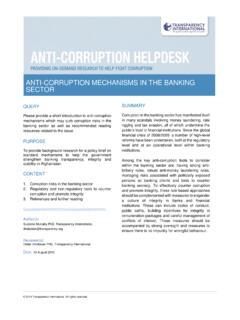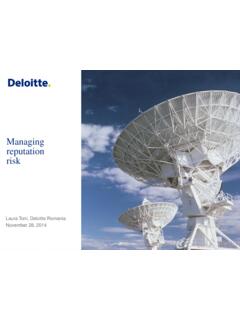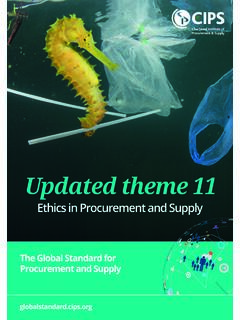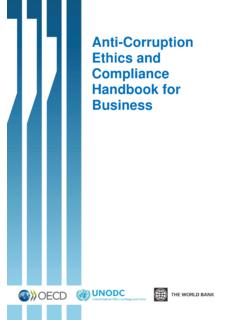Transcription of Managing environmental, social and governance risks in non ...
1 June 2020 PSI ESG Guide for Non-Life Insurance: Version first ESG guide for the global insurance industry developed by UN Environment Programme s Principles for Sustainable Insurance InitiativeThis PSI project was co-sponsored and co-led byManaging environmental, social and governance risks in non-life insurance businessPSI Project Team MembersAllianz, American Hellenic Hull, American Property Casualty Insurance Association, AXA, Generali, MAPFRE, Munich Re, QBE, RSA, Santam, Swiss Re, Temple University s Fox School of Business, UN Environment Programme.
2 University of Technology Sydney, West Chester University, and Zurich Managing environmental, social and governance risks in non-life insurance businessContents1. About UN Environment Programme s Principles for Sustainable Insurance Initiative ..22. Acknowledgements ..33. Executive Developing the guide ..85. Aims and scope of the guide ..96. Using the guide: Possible actions to manage ESG risks .. Developing your ESG approach .. Establishing your ESG risk appetite .. Integrating ESG issues into your organisation.
3 Establishing roles and responsibilities for ESG issues .. Escalating ESG risks to decision-makers .. Detecting and analysing ESG risks .. Decision-making on ESG risks .. Reporting on ESG risks ..187. ESG risks and economic sectors heat map ..198. ESG risks and lines of business heat map ..229. Risk mitigation and good practices ..2510. The Principles for Sustainable Insurance ..28 Annex ..30 Principles for Sustainable Insurance- 2 -1. About UN Environment Programme s Principles for Sustainable Insurance InitiativeEndorsed by the UN Secretary-General and insurance industry CEOs, the Principles for Sustainable Insurance (PSI) serve as a global framework for the insurance industry to address environmental, social and governance (ESG)
4 risks and opportunities and a global initiative to strengthen the insurance industry s contribution as risk managers, insurers and investors to building resilient, inclusive and sustainable communities and by UN Environment Programme s Finance Initiative, the PSI was launched at the 2012 UN Conference on Sustainable Development (Rio+20), and has led to the largest collaborative initiative between the UN and the insurance industry. The vision of the PSI Initiative is of a risk-aware world, where the insurance industry is trusted and plays its full role in enabling a healthy, safe, resilient and sustainable society.
5 Its purpose is to better understand, prevent and reduce ESG risks , and to better manage opportunities to provide quality and reliable risk The Principles for Sustainable Insurance provide a global roadmap to develop and expand the innovative risk management and insurance solutions that we need to promote renewable energy, clean water, food security, sustainable cities and disaster-resilient communities. UN Secretary-General (June 2012) Managing environmental, social and governance risks in non-life insurance business- 3 -2.
6 AcknowledgementsWe are indebted to all the individuals and organisations worldwide who contributed invaluable insights to the development of this pioneering guide through interviews, a global survey, a public consultation, and various meetings and Project Team Co-LeadsButch Bacani, Programme Leader, UN Environment Programme s Principles for Sustainable Insurance InitiativeJames Wallace, Insurance Lead ESG Integration, Group ESG Office, Allianz SEPSI Project Team MembersBel n Barona, Isabel Bodlak-Karg, Alina Morozova (Allianz)Ioanna Skondra (American Hellenic Hull) Lisa Brown, David Snyder (American Property Casualty Insurance Association) Esther Crauser-Delbourg, Suzanne Scatliffe, Sylvain Vanston (AXA) Andrea Dallevedove, Barbara Morgan, Marta Pagan, Lucia Silva (Generali) Isabel Braga, Fatima Lima (MAPFRE) Lucia R ckner, Michael Willander (Munich Re) Sharanjit Paddam, Sereina Pfister (QBE) Sarah Hartley, Alan Shaw, Laura Spiers (RSA) Jeeten Morar, Vanessa Otto-Mentz (Santam)
7 Thierry Corti, Martin Weymann, Lasse Wallquist (Swiss Re) Randy Dumm (Temple University s Fox School of Business) James Hutchin (University of Technology Sydney) Olivia Fabry, Alice Merry, Yingzhi Tang, Rob Wilson (UNEP) Matt Shea (West Chester University) Linda Freiner, John Scott (Zurich)Principles for Sustainable Insurance- 4 -3. Executive SummaryAs risk managers, insurers and investors, the insurance industry plays an important role in promoting economic, social and environmental sustainability or sustainable development.
8 With the adoption of the UN Sustainable Development Goals (SDGs), Paris Agreement on Climate Change, and Sendai Framework for Disaster Risk Reduction in 2015, and the upcoming Post-2020 Global Biodiversity Framework, there is growing pressure and urgency across all sectors of society to respond and find solutions to sustainability challenges the world is facing. Environmental, social and governance (ESG) issues also known as sustainability issues pose a shared risk to insurers, communities, businesses, cities, governments and society at large, providing a strong incentive for innovation and collaboration.
9 Some ESG issues have varying implications, with some increasingly being recognised to be potentially financially material ( climate change, ecosystem degradation, pollution).The four Principles for Sustainable Insurance, including a list of possible actions, provide a common aspiration and global framework for the insurance industry to manage ESG issues, and to strengthen its contribution to building resilient, inclusive and sustainable communities and document is a result of a multi-year PSI initiative to develop the first global guide to manage ESG risks in risk assessment and insurance underwriting.
10 It has an initial focus on non-life insurance business also known as property and casualty insurance guide goes to the heart of implementing the Principles for Sustainable Insurance, particularly Principle 1: We will embed in our decision-making environmental, social and governance issues relevant to our insurance business . It builds on studies since 2007 on the relevance of ESG issues to the insurance business that led to the development of the PSI, and subsequent studies and activities after the PSI was launched in is growing interest in the insurance industry and the wider financial sector in under-standing the correlation between ESG factors and strong performance of companies across industries.
